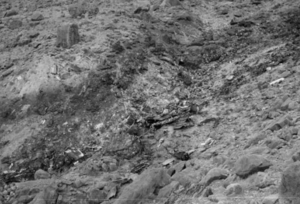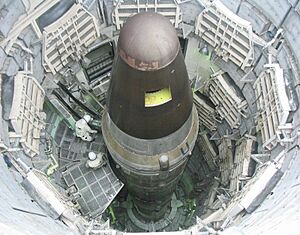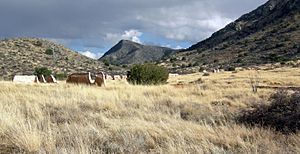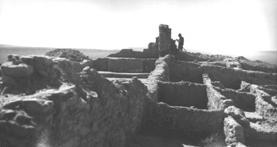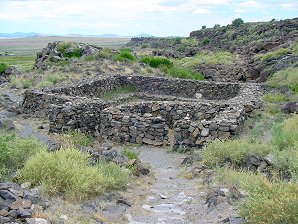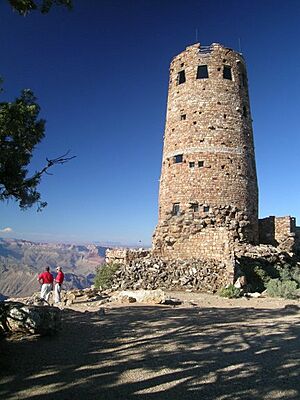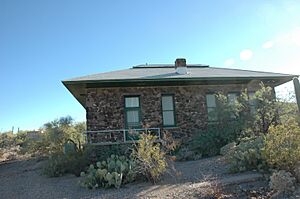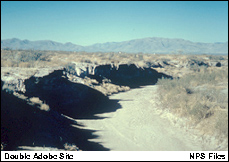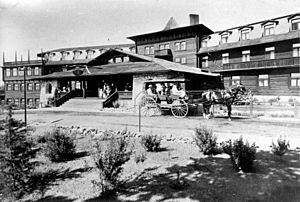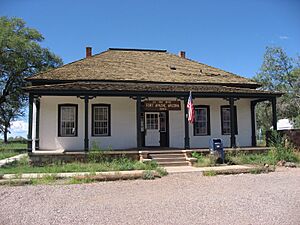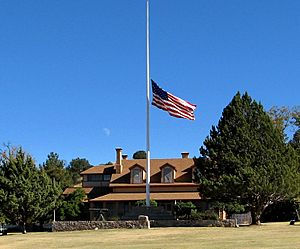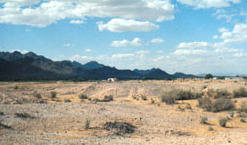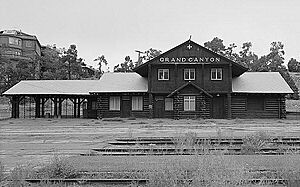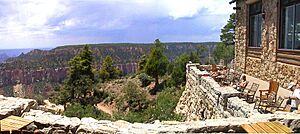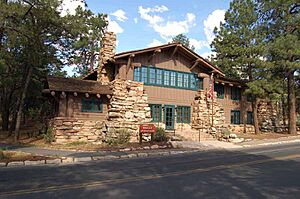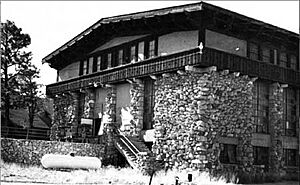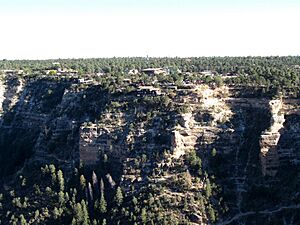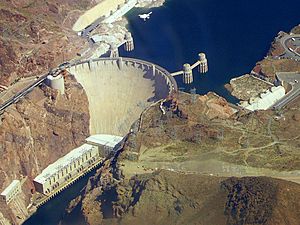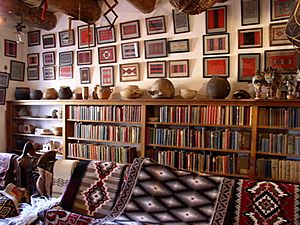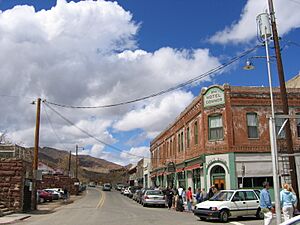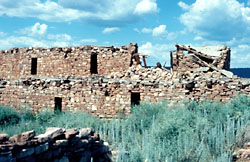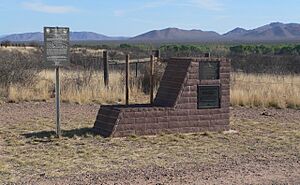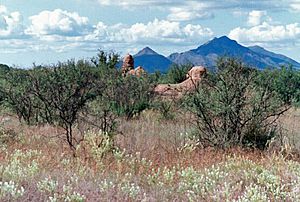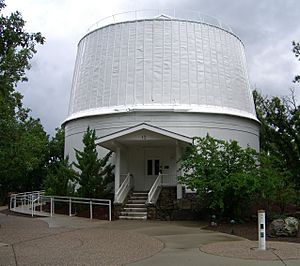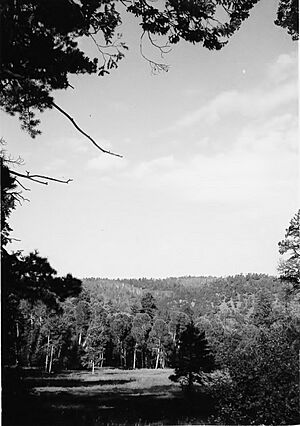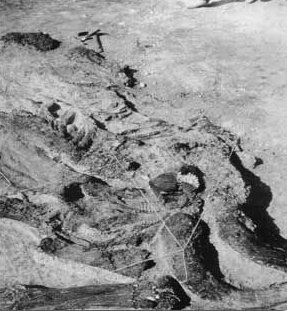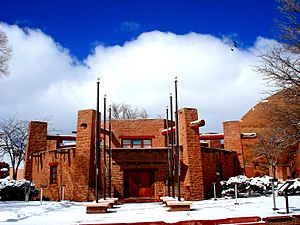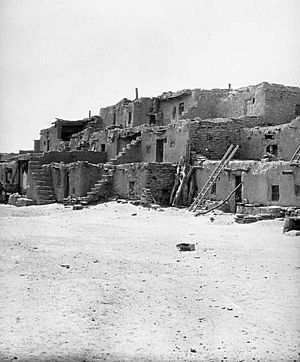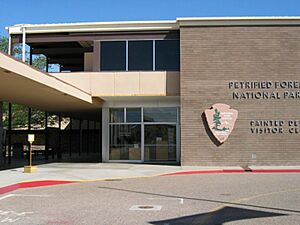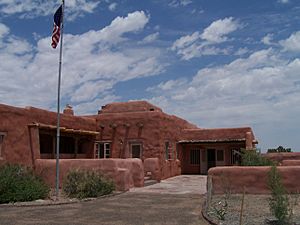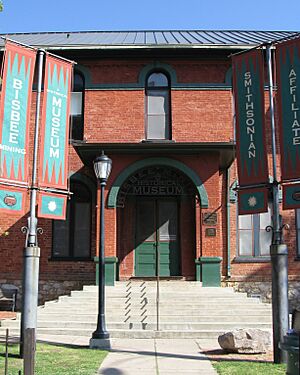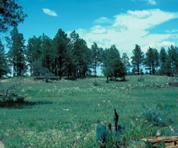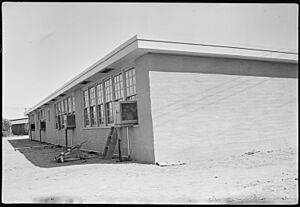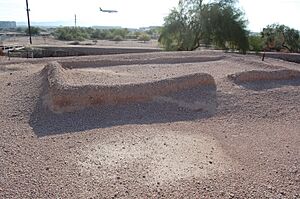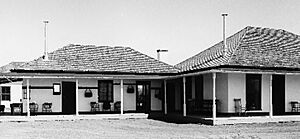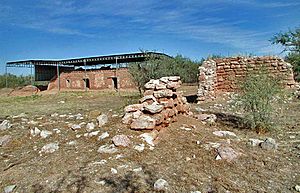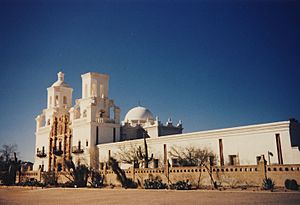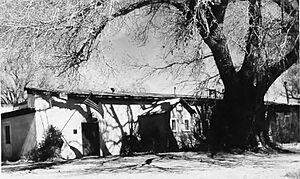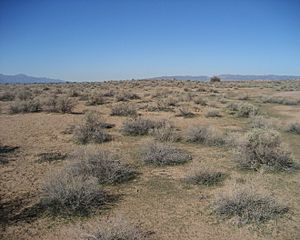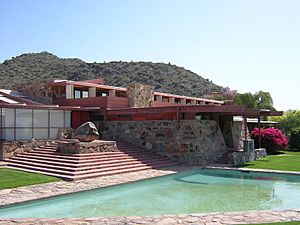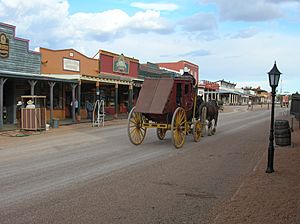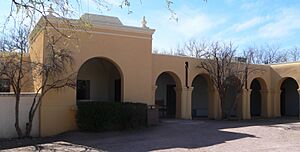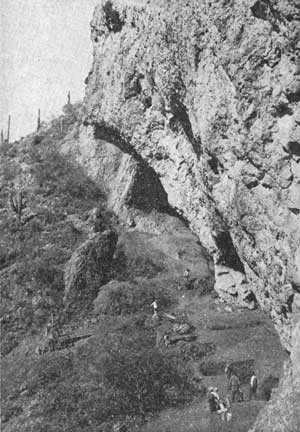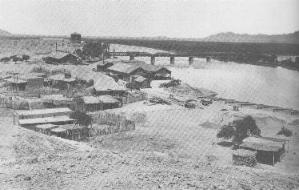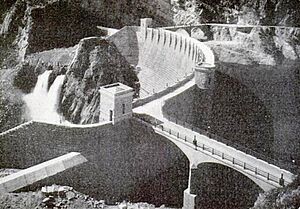List of National Historic Landmarks in Arizona facts for kids
Arizona is home to many amazing places that are super important to the history of the United States. These special spots are called National Historic Landmarks (NHLs). They are recognized because they tell important stories about our country's past.
There are 47 National Historic Landmarks in Arizona. This number includes the famous Hoover Dam, which is partly in Nevada. It also includes Yuma Crossing and Associated Sites, which stretches into California. The very first landmark chosen in Arizona was the San Xavier del Bac Mission in 1960. The newest one is the Klagetoh (Leegito) Chapter House, added in 2021.
Contents
- Discover Arizona's Historic Landmarks
- 1956 Grand Canyon Aviation Accident Site
- Air Force Facility Missile Site 8
- Apache Pass and Fort Bowie
- Awatovi Ruins
- Casa Malpais Site
- Mary Jane Colter Buildings
- Desert Laboratory
- Double Adobe Site
- El Tovar Hotel
- Fort Apache and Theodore Roosevelt School
- Fort Huachuca
- Gatlin Site
- Grand Canyon Depot
- Grand Canyon Lodge
- Grand Canyon Park Operations Building
- Grand Canyon Power House
- Grand Canyon Village
- Hoover Dam
- Hubbell Trading Post
- Jerome Historic District
- Kinishba Ruins
- Klagetoh (Leegito) Chapter House
- Lehner Mammoth-Kill Site
- Los Santos Ángeles de Guevavi
- Lowell Observatory
- C. Hart Merriam Base Camp Site
- Murray Springs Clovis Site
- Navajo Nation Council Chamber
- Old Oraibi
- Painted Desert Community Complex Historic District
- Painted Desert Inn
- Phelps Dodge General Office Building
- Point of Pines Sites
- Poston Elementary School, Unit 1, Colorado River Relocation Center
- Pueblo Grande Ruin and Irrigation Sites
- Sage Memorial Hospital School of Nursing
- San Bernardino Ranch
- San Cayetano de Calabazas
- San Xavier del Bac Mission
- Sierra Bonita Ranch
- Snaketown
- Taliesin West
- Tombstone Historic District
- Tumacacori Museum
- Ventana Cave
- Winona Site
- Yuma Crossing and Associated Sites
- Former Landmarks
- More to Explore
Discover Arizona's Historic Landmarks
1956 Grand Canyon Aviation Accident Site
This site marks the location of the first major airplane crash in the United States. More than 100 people died in this accident. This sad event led to the creation of the Federal Aviation Administration. This agency helps make sure air travel is safe for everyone.
Air Force Facility Missile Site 8
This site is the last remaining Titan II missile launch facility. It's now a museum where you can learn about these powerful missiles. It shows a part of history when countries were building many missiles.
Apache Pass and Fort Bowie
This area remembers the conflicts between the Chiricahua Apaches and the United States military. It also protects the ruins of Fort Bowie. This fort was an important place during those times.
Awatovi Ruins
These are the ruins of a 500-year-old pueblo village. Explorers with Coronado visited this village way back in 1540. It shows how people lived in Arizona many centuries ago.
Casa Malpais Site
This ancient ruin was built around 1250. People from the Mogollon culture lived here until about 1400. Today, you can take tours and visit a museum to learn more about this historic site.
Mary Jane Colter Buildings
These buildings are found in Grand Canyon National Park. They were designed by a famous architect named Mary Jane Colter. Her designs include the Desert View Watchtower, Hermits Rest, Hopi House, and The Lookout. These buildings blend beautifully with the natural landscape.
Desert Laboratory
This laboratory was started in 1903. Scientists here studied how plants survive in the dry desert. Their long-term experiments helped create the science of Ecology. It is now part of the University of Arizona.
Double Adobe Site
This is an important archaeological site. It shows where the ancient Cochise Culture developed. This culture existed thousands of years ago in Arizona.
El Tovar Hotel
The El Tovar is a classic hotel located at the South Rim of the Grand Canyon. It has welcomed visitors for many years. It is known for its beautiful design and amazing views.
Fort Apache and Theodore Roosevelt School
This site was once the historic Fort Apache. Later, it became a school to help Native American children learn new ways of life. Today, it is a tribal museum.
Fort Huachuca
Fort Huachuca honors the "Buffalo Soldiers". These were African American soldiers who served in the U.S. Army. The fort has a rich military history.
Gatlin Site
This site protects a Hohokam platform mound, pit houses, and ancient canals. These structures were built by the Hohokam people long ago. They show how advanced their society was.
Grand Canyon Depot
This railway station was built in 1909–1910. It was made for the Atchison, Topeka and Santa Fe Railroad. It helped bring many visitors to the Grand Canyon.
Grand Canyon Lodge
This lodge is located at Bright Angel Point on the North Rim of the Grand Canyon. It offers stunning views of the canyon.
Grand Canyon Park Operations Building
This building was constructed in 1929 for the National Park Service. Its design helps it blend in with the natural beauty of the Grand Canyon.
Grand Canyon Power House
This building was designed to look rustic. Its purpose was to provide power for the railroad. Its clever design helped it fit into the natural surroundings.
Grand Canyon Village
This planned town is important for its smart design and care for the environment. It shows how people can live and work in a beautiful natural area.
Hoover Dam
The Hoover Dam is a historic dam, power plant, and water storage facility. It is a huge engineering marvel. It provides water and electricity to many people.
Hubbell Trading Post
This trading post was a meeting place for two cultures: the Navajo people and the settlers. It played an important role in trade and cultural exchange.
Jerome Historic District
Jerome is a historic copper mining town. It was once a bustling place with many miners. Today, it is a popular spot to visit.
Kinishba Ruins
These are the ruins of a large pueblo village. You can visit them through the Fort Apache Historical Park. They offer a glimpse into ancient pueblo life.
Klagetoh (Leegito) Chapter House
This chapter house is a significant place for the Navajo Nation. It serves as a local government and community center. It helps preserve Navajo culture and traditions.
Lehner Mammoth-Kill Site
This site is where the ancient Clovis culture people hunted and butchered mammoths. It provides important clues about early human life in North America.
Los Santos Ángeles de Guevavi
These are the ruins of a Spanish mission church. It was founded in 1691. It shows the early Spanish influence in Arizona.
Lowell Observatory
This observatory is famous because the planet Pluto was discovered here. It is a place where scientists study the stars and planets.
C. Hart Merriam Base Camp Site
This was the work site of C. Hart Merriam. He was a pioneering eco-biologist. He studied how living things interact with their environment.
Murray Springs Clovis Site
This is another important Clovis culture site. It is linked to the hunting of bison and mammoths. You can visit this site to learn about ancient hunters.
This building is the center of government for the Navajo Nation. It is where important decisions are made for the Navajo people.
Old Oraibi
Old Oraibi is a historic Hopi village. It is one of the oldest continuously inhabited settlements in North America. It holds deep cultural significance.
Painted Desert Community Complex Historic District
This complex is located in Petrified Forest National Park. It is known for its unique architecture and design. It helps visitors explore the beautiful Painted Desert.
Painted Desert Inn
This historic lodge is also in the Petrified Forest National Park. It offers a place for visitors to rest and enjoy the views.
Phelps Dodge General Office Building
This building was the headquarters for the Phelps Dodge mining company for many years. It is now the Bisbee Mining and Historical Museum.
Point of Pines Sites
This area has many archaeological sites. They are linked to the Anasazi, Mogollon, and Hohokam cultures. It was also a site for archaeological studies.
Poston Elementary School, Unit 1, Colorado River Relocation Center
This is the only surviving elementary school building from any World War II-era Japanese internment camp. It is a reminder of a difficult time in American history.
Pueblo Grande Ruin and Irrigation Sites
This site includes the Pueblo Grande Ruin and nearby Hohokam-Pima Irrigation Sites. These show how ancient people built complex irrigation systems.
Sage Memorial Hospital School of Nursing
This school of nursing was an important place for healthcare and education. It played a role in training nurses in the region.
San Bernardino Ranch
This is a historic cattle ranch. It has a long history of ranching in Arizona.
San Cayetano de Calabazas
This Spanish mission is also known as Calabasas. It is part of Tumacácori National Historic Park. It shows the early mission history of the area.
San Xavier del Bac Mission
This Spanish mission was founded in 1699. It is known for its stunning architecture and rich history. It is often called the "White Dove of the Desert."
Sierra Bonita Ranch
This was the first permanent American cattle ranch in Arizona. It helped establish the ranching industry in the state.
Snaketown
Snaketown holds the archaeological remains of the Hohokam culture. It is a very important site for understanding these ancient people.
Taliesin West
This was the winter home of the famous architect Frank Lloyd Wright. It is a unique example of his architectural style.
Tombstone Historic District
Tombstone is a classic Western mining boomtown. It is famous for events like the gunfight at the OK Corral.
Tumacacori Museum
This museum is dedicated to Spanish missions. The museum building itself is an architectural landmark.
Ventana Cave
Ventana Cave is an archaeological site. It has evidence that Native Americans lived in this area for the last 4,000 years.
Winona Site
This archaeological site shows evidence of cultural changes. These changes happened after the eruption of Sunset Crater.
Yuma Crossing and Associated Sites
This area includes archaeological and historical sites. These include the Yuma Quartermaster Depot and the Arizona Territorial Prison. It was an important crossing point on the Colorado River.
Former Landmarks
Some places were once National Historic Landmarks but are no longer on the list.
Roosevelt Dam
When it was built in 1906–1911, Roosevelt Dam was the tallest masonry dam in the world. It was also the first major dam project in the western United States. However, it was changed a lot between 1989 and 1996. The original structure was covered in concrete, so it was removed from the list.
More to Explore


